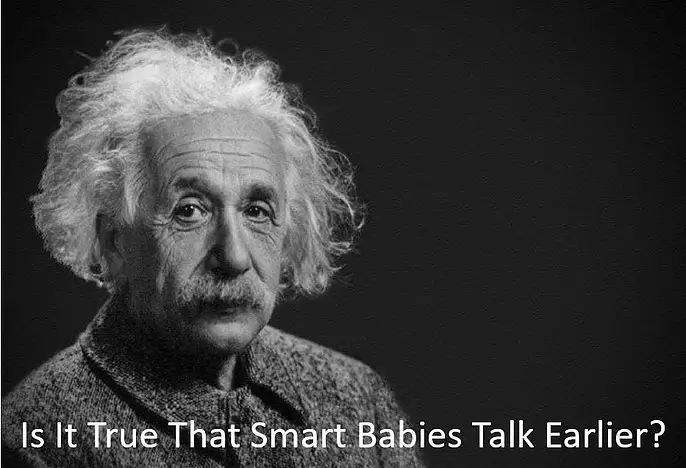Is It True That Smart Babies Talk Earlier?

Babies start learning how to talk and respond to their carer’s voice much earlier than we think.
In fact, right after birth, babies tend to closely observe and listen to other people talk.
By 6 weeks, they will make a variety of cooing and gurgling sounds.
As your tot gets better at making sounds, she will start babbling away around 6 months.
Now, most babies will say their first “real” word between 12-18 months of age and begin to form simple sentences a few months later.
But what if my baby starts articulating her first proper word earlier than that? Is she destined to be a genius?
Let’s review the evidence from various research and discuss what it means if your baby is an early talker.
Is It True That Smart Babies Talk Earlier?
Based on the available evidence, the great majority of intellectually gifted kids were early talkers in infancy. However, it shouldn’t be assumed that all early talkers are exceptionally smart. There are other traits that these kids should demonstrate to be classified as a genius. However, all early talkers will excel at literacy and language at school compared to the kids who hit this milestone as expected or those who achieved it late. It is also possible that kids who began speaking late and have other extraordinary abilities can be highly intelligent. They are classified as having Einstein syndrome.
Advanced Language Skills in Babies
Is it safe to assume my baby is super smart because she started talking way ahead of her peers at around 9 months?
Yes or no?
Well, there is no black or white answer to that question.
Advanced language ability in babies is one of the characteristics of high intelligence.
But there is a number of other traits associated with intellectual giftedness.
Based on the study carried out by Davidson Institute on 241 kids classified as profoundly gifted, it turned out that:
- 94% of those kids were alert during infancy and had a long attention span.
- 91% of them had advanced language skills, and on average, they spoke their first word at 9 months.
- 60% had advanced motor skills.
Furthermore, intellectually gifted children usually demonstrate a few of these traits.
In other words, early talking doesn’t necessarily mean exceptional intelligence unless, of course, your baby excels in other areas as well.
For more information on signs of intelligence in babies, check out my older post: How Can You Tell If Your Baby Is Intelligent?
To determine if your child is gifted, you should have them tested. And your child must be older than 6 years to perform a test and achieve the most reliable result. That’s because completing any tests on young kids is a challenge of its own, even more so assessing their IQ. So, so there is no point rushing your tot for early assessment. It’s worth keeping a record of all your baby’s achievements. So that once she is ready for the test, you will have a handy reference.
Relation Between Early Talking and Language and Literacy Abilities
Other research undertaken by scientists from Haskins Laboratories investigated the impact of early talking on literacy and language skills development in primary school kids.
These skills were determined by literacy assessments, such as reading, spelling, vocabulary, and comprehension. As well as and non-verbal IQ test.
During those tests, the formation of children’s neural systems and their efficiency in language processing were studied using fMRI (Functional magnetic resonance imaging) of their brains.
Based on the 84 school-age participants, the results confirmed that the children who started talking early in infancy performed significantly better in literacy tasks than the kids who started forming sentences on target and those who achieved this milestone late.
This conclusion is consistent with findings from similar studies conducted in 1990, 1997, and 1998.
So, 4 independent studies and similar conclusions. Looks pretty reliable to me.
Why Is It Beneficial To Identify Giftedness In Your Child?
Because both children and their parents will require guidance and extra support during the upbringing of the gifted child. As it is a common problem amongst highly intellectual kids to have difficulties forming relationships with their peers and being socially isolated.
So, social and emotional support is crucial for them to thrive and fully develop their talents.
Also, gifted children will require an appropriate education approach to accommodate their unique abilities.
That’s because most educational facilities are designed for children developing at average rates with limited curriculum adaptability to meet the needs of gifted kids.
Gifted and talented children: family life
Delayed Language Skills Don’t Rule Out Giftedness!
On the other side of the spectrum, there are many babies that are regarded s late talkers.
And it is possible that a child with delayed language ability can also be considered gifted.
A classic example is Albert Einstein, an unquestionable genius who just started to speak sentences at 5.
In fact, a condition named after this very intellectual is Einstein syndrome.
It identifies bright late talkers with exceptional analytical thinking.
There is a number of reasons why babies may reach this milestone later than their peers.
First, it may be that every baby develops at a different pace. The baby is often busy developing other developmental milestones, such as gross motor skills while waiting for the verbal skills to emerge.
Another reason for delayed speaking is hearing difficulties. So, if the baby cannot hear the sounds, therefore, cannot learn to talk. Therefore, the key is to identify the problem right from the start.
Finally, delay in talking can also indicate autism or another form of intellectual disability. Even though a great majority of kids with autism are late talkers, a great majority of kids with delayed verbal aren’t autistic! The reality is that many of them are misdiagnosed and unnecessarily treated for autism.
Final Few Lines
Despite the fact that early talking is an attribute of intellectual kids, parents shouldn’t assume their child is a genius simply because of this ability alone.
Having said that, there is a strong correlation between early verbal skills and literacy and language ability at school. Kids who take earlier are significantly more advanced in literacy at school age than the kids who were on target or were late talkers.
It is also possible that kids who started talking later but demonstrated other advanced abilities can appear highly intelligent. And are classified as having Einstein syndrome.
Once your child turns 6, you can do a gifted assessment or testing to determine whether they are intellectually gifted or not.
